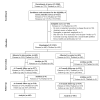Effectiveness of a Smartphone-Based Stress Management Program for Depression in Hospital Nurses During COVID-19 in Vietnam and Thailand: 2-Arm Parallel-Group Randomized Controlled Trial
- PMID: 39213033
- PMCID: PMC11399744
- DOI: 10.2196/50071
Effectiveness of a Smartphone-Based Stress Management Program for Depression in Hospital Nurses During COVID-19 in Vietnam and Thailand: 2-Arm Parallel-Group Randomized Controlled Trial
Abstract
Background: During the COVID-19 pandemic, health care professionals experienced high levels of depression. However, extant research has not highlighted effective internet-based psychological interventions to improve the mental health in this population during the pandemic. It remains unclear whether self-guided, internet-based cognitive behavioral therapy (iCBT) programs are effective in improving the mental health of health care workers during the COVID-19 pandemic.
Objective: The aim of this study was to evaluate the effectiveness of a smartphone-based iCBT stress management program for reducing the depression experienced by nurses in Vietnam and Thailand.
Methods: From March to April 2022, a 2-arm, parallel-group randomized controlled trial was implemented. One arm offered a 7-week self-guided iCBT program, and the other offered treatment as usual as a control arm. Full-time nurses were recruited from 6 hospitals: 2 hospitals in Vietnam and 4 hospitals in Thailand. The primary outcome of this program was the severity of depression measured by the Depression Anxiety Stress Scale-21 items. Follow-up surveys were conducted to measure the change in depression severity at 3 months (July-August 2022) and at 6 months (October-November 2022) after baseline. Mixed modeling for repeated measures was used to test the effects of the intervention compared with the control for the follow-up.
Results: A total of 1203 nurses were included in this study: 602 in the intervention group and 601 in the control group. The follow-up rate at 3 and 6 months ranged from 85.7% (515/601) to 87.5% (527/602). The completion rate for the program was 68.1% (410/602). The group difference in depression was significant at the 3-month follow-up (coefficient=-0.92, 95% CI -1.66 to -0.18; P=.02) and nonsignificant at the 6-month follow-up (coefficient=-0.33, 95% CI -1.11 to 0.45; P=.41). The estimated effect sizes were -0.15 and -0.06 at the 3- and 6-month follow-ups, respectively.
Conclusions: Our study shows that the smartphone-based iCBT program was effective in reducing depression at the 3-month follow-up among hospital nurses in Vietnam and Thailand during the COVID-19 pandemic. However, the effect size was small, and therefore, these results may not be clinically meaningful.
Trial registration: UMIN Clinical Trials Registry UMIN000044145; https://center6.umin.ac.jp/cgi-open-bin/ctr/ctr_view.cgi?recptno=R000050128.
International registered report identifier (irrid): RR2-10.20944/preprints202303.0450.v1.
Keywords: COVID-19; depression; digital mental health intervention; health care workers; mobile phone; nurses; unguided program; universal prevention.
©Kazuhiro Watanabe, Thuy Thi Thu Tran, Narisara Sripo, Asuka Sakuraya, Kotaro Imamura, Plernpit Boonyamalik, Natsu Sasaki, Thanate Tienthong, Hiroki Asaoka, Mako Iida, Quynh Thuy Nguyen, Nga Thi Nguyen, Son Thai Vu, Thuy Thi Ngo, Tham Thi Luyen, Long Duc Nguyen, Nga Thi Viet Nguyen, Binh Thanh Nguyen, Yutaka Matsuyama, Yukie Takemura, Daisuke Nishi, Akizumi Tsutsumi, Huong Thanh Nguyen, Orawan Kaewboonchoo, Norito Kawakami. Originally published in the Journal of Medical Internet Research (https://www.jmir.org), 30.08.2024.
Conflict of interest statement
Conflicts of Interest: NK reports personal fees from Junpukai Foundation, Riken Institute, JAXA, Sekisui Chemical Co. Ltd, and SB@Work outside the submitted work. NK, KI, and AS are employed with the Department of Digital Mental Health, an endowment department that is supported by an unrestricted grant from 15 enterprises [40].
Figures
References
-
- Cénat Jude Mary, Blais-Rochette C, Kokou-Kpolou CK, Noorishad P, Mukunzi JN, McIntee S, Dalexis RD, Goulet M, Labelle PR. Prevalence of symptoms of depression, anxiety, insomnia, posttraumatic stress disorder, and psychological distress among populations affected by the COVID-19 pandemic: A systematic review and meta-analysis. Psychiatry Res. 2021 Jan;295:113599. doi: 10.1016/j.psychres.2020.113599. https://europepmc.org/abstract/MED/33285346 S0165-1781(20)33260-1 - DOI - PMC - PubMed
-
- Lee BEC, Ling M, Boyd L, Olsson C, Sheen J. The prevalence of probable mental health disorders among hospital healthcare workers during COVID-19: A systematic review and meta-analysis. J Affect Disord. 2023 Jun 01;330:329–345. doi: 10.1016/j.jad.2023.03.012. https://linkinghub.elsevier.com/retrieve/pii/S0165-0327(23)00339-7 S0165-0327(23)00339-7 - DOI - PMC - PubMed
-
- Serrano-Ripoll Maria J, Meneses-Echavez JF, Ricci-Cabello Ignacio, Fraile-Navarro D, Fiol-deRoque Maria A, Pastor-Moreno Guadalupe, Castro A, Ruiz-Pérez Isabel, Zamanillo Campos R, Gonçalves-Bradley Daniela C. Impact of viral epidemic outbreaks on mental health of healthcare workers: a rapid systematic review and meta-analysis. J Affect Disord. 2020 Dec 01;277:347–357. doi: 10.1016/j.jad.2020.08.034. http://hdl.handle.net/10668/16176 S0165-0327(20)32639-2 - DOI - PMC - PubMed
-
- Sijbrandij M, Horn R, Esliker R, O'May Fiona, Reiffers R, Ruttenberg L, Stam K, de Jong J, Ager A. The effect of psychological first aid training on knowledge and understanding about psychosocial support principles: a cluster-randomized controlled trial. Int J Environ Res Public Health. 2020 Jan 11;17(2):484. doi: 10.3390/ijerph17020484. https://www.mdpi.com/resolver?pii=ijerph17020484 ijerph17020484 - DOI - PMC - PubMed
-
- Chen R, Chou K, Huang Y, Wang T, Liu S, Ho L. Effects of a SARS prevention programme in Taiwan on nursing staff's anxiety, depression and sleep quality: a longitudinal survey. Int J Nurs Stud. 2006 Feb;43(2):215–225. doi: 10.1016/j.ijnurstu.2005.03.006. https://europepmc.org/abstract/MED/15927185 S0020-7489(05)00068-4 - DOI - PMC - PubMed
Publication types
MeSH terms
Associated data
LinkOut - more resources
Full Text Sources
Medical
Miscellaneous


